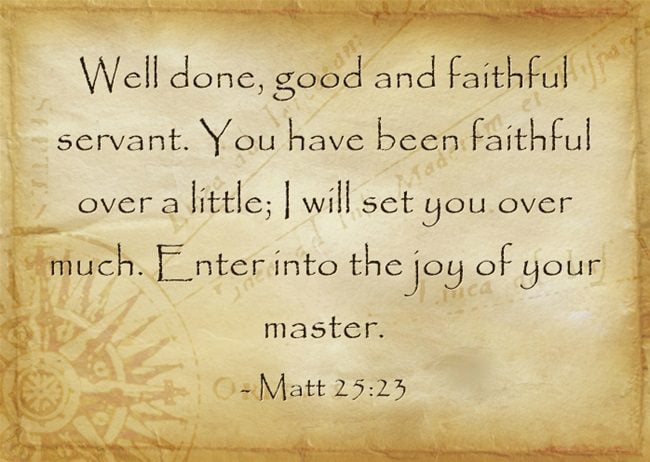Every one of us have been given talents, time, and treasure so what have we done with these and what will we do with them since we are all stewards of God.
Matthew 25:29 “For to everyone who has will more be given, and he will have an abundance. But from the one who has not, even what he has will be taken away.”
Parables are earthly stories that teach a heavenly concept and this is what Jesus was doing in the Parable of the Talents (Matt 25:14-30) and the man going on the journey is likely Jesus Himself Who gives His servants talents (Matt 25:14) and “To one he gave five talents, to another two, to another one, to each according to his ability. Then he went away” (Matt 25:15). It should be noted that the talent is a monetary value of money (as the Greek says) and is equivalent to about twenty years labor, so it’s a significant amount of money we’re talking about and this parable is about the stewardship that God has entrusted to us with what we’ve been given. One servant doubled his five talents to ten (Matt 25:20) and the master says “Well done, good and faithful servant. You have been faithful over a little; I will set you over much. Enter into the joy of your master” (Matt 25:21). The one who received two talents also doubled his talents and the master also said “Well done, good and faithful servant. You have been faithful over a little; I will set you over much. Enter into the joy of your master” (Matt 25:23) but the one who had been given one buried and or did nothing with it at all and the master says “You wicked and slothful servant! You knew that I reap where I have not sown and gather where I scattered no seed? Then you ought to have invested my money with the bankers, and at my coming I should have received what was my own with interest. So take the talent from him and give it to him who has the ten talents” (Matt 25:26-29). The point is that Jesus expects us to use our earthly wealth for His kingdom purposes as He is the Master, otherwise what we have will be taken away and given to others.
First Peter 4:10 “As each has received a gift, use it to serve one another, as good stewards of God’s varied grace.”
I believe that Peter is talking about gifts of the Spirit because of the context of this chapter (1st Pet 4) and the gifts are not for our own purposes but for the purposes of the church; to serve one another. If we don’t use our gifts, we might lose what we have, as referenced in Matthew 25, because we’ve not been good stewards with what God has entrusted us with.
Titus 1:6-8 “If anyone is above reproach, the husband of one wife, and his children are believers and not open to the charge of debauchery or insubordination. For an overseer, as God’s steward, must be above reproach. He must not be arrogant or quick-tempered or a drunkard or violent or greedy for gain, 8 but hospitable, a lover of good, self-controlled, upright, holy, and disciplined.”
An overseer is like a shepherd overseeing a flock and in this case, it is the church that the overseer (or pastor) is over and he is a steward, God’s steward, and must live a life that is above reproach, otherwise he is not fit to pastor a church at all. The behavioral expectations that are listed are prohibitions for a pastoral position as God’s steward.
First Timothy 1:3-5 “As I urged you when I was going to Macedonia, remain at Ephesus so that you may charge certain persons not to teach any different doctrine, nor to devote themselves to myths and endless genealogies, which promote speculations rather than the stewardship from God that is by faith. The aim of our charge is love that issues from a pure heart and a good conscience and a sincere faith.”
The fact that this instruction from Paul comes from a pastoral epistle (letter) shows that, once again, the pastor is responsible for the flock but this is not about the pastor’s behavior necessarily but about the charge given to him by God to rebuke those who teach different doctrines than what is found in Scripture because some false teachings were devoted to myths, fables, and endless (and useless) genealogies that are only speculative at best. Once again this shows that being a good steward isn’t always about money nor is it only about the gifts and proper use of the Spiritual gifts God gives to every believer, including the pastor.
Ephesians 3:1-3 “For this reason I, Paul, a prisoner for Christ Jesus on behalf of you Gentiles— assuming that you have heard of the stewardship of God’s grace that was given to me for you, how the mystery was made known to me by revelation, as I have written briefly.”
What does Paul mean by “the stewardship of God’s grace that was given to” him? This is the gospel itself and God holds Paul responsible for the revelation that he was given. Every one of us is also responsible for what has been given to us by God’s revelation, mainly from Scripture, and we are going to be held responsible for what we’ve done with the knowledge of God’s amazing grace.
Luke 16:11 “If then you have not been faithful in the unrighteous wealth, who will entrust to you the true riches?”
This verse returns back to the thought given in the Parable of the Talents in Matthew 25. If we aren’t faithful in what God has entrusted to us, even if it’s little, then why would we ever expect that he would entrust us with true riches? Obviously He wouldn’t because to he or she who has been given much, much will be required or more specifically as Jesus said “Everyone to whom much was given, of him much will be required, and from him to whom they entrusted much, they will demand the more” (Luke 12:48).
Second Corinthians 9:6-7 “The point is this: whoever sows sparingly will also reap sparingly, and whoever sows bountifully will also reap bountifully. Each one must give as he has decided in his heart, not reluctantly or under compulsion, for God loves a cheerful giver.”
If a farmer sows sparing, the farmer must realize that he or she won’t reap much but if they sow bountifully, they can expect a more bountiful harvest. It is a cause and effect. God doesn’t need your money or want your offerings as much as He does your heart which is why a cheerful giver doesn’t give out of compulsion or give reluctantly but will give cheerfully or joyfully.
Conclusion
Jesus said “Whoever has will be given more, and they will have an abundance. Whoever does not have, even what they have will be taken from them.” (Matt 13:12) so which are you? Are you a good steward? Then you will receive a great reward but if not, you will receive little or next to nothing. As for me, I would rather hear Jesus say “Well done, good and faithful servant. You have been faithful over a little; I will set you over much. Enter into the joy of your master” (Matt 25:23). I suspect that if you’re a believer, that’s what you want to hear too.
Article by Jack Wellman
Jack Wellman is Pastor of the Mulvane Brethren church in Mulvane Kansas. Jack is also the Senior Writer at What Christians Want To Know whose mission is to equip, encourage, and energize Christians and to address questions about the believer’s daily walk with God and the Bible. You can follow Jack on Google Plus or check out his book Blind Chance or Intelligent Design available on Amazon.












